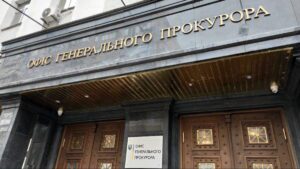
Israel has made a strategic decision to provide assistance to Ukraine, but it has to exercise caution when providing military assistance, Israel’s Ambassador Extraordinary and Plenipotentiary to Ukraine Mikhail Brodsky said in an exclusive interview with Interfax-Ukraine.
“Israel, unfortunately, is located in a dysfunctional region. It is such a powder keg on top of which Israel sits. The security threats to Israel, the threats to the lives of both Israeli soldiers and Israeli citizens are colossal. Ukraine today is facing a very powerful adversary, a superpower, from Israel in this sense, the situation is different, the threats are different, but nevertheless, this is also a serious war, a war on terror, which requires maximum resources, maximum mobilization of society.For these reasons, and because of the sensitive relationship that we have with Russia, we We think first of all about our own interests and are forced to exercise caution,” he said.
“This does not mean that we do not help Ukraine. From the first day we made a strategic decision to provide the maximum assistance to Ukraine that we can afford. Without crossing the “red lines” and without endangering our national interests. Without endangering the lives of ordinary Israelis “, – note the diplomat.
Brodsky noted “hundreds of tons of humanitarian aid that we supplied – medicine, food, fresh water, generators, water desalination plants. This is a field hospital, which is located in the Lviv region, during the stay of Israeli doctors there they provided assistance to 6 thousand Ukrainians – refugees and local residents.
In addition, he recalled “dozens of people who were taken to Israel for treatment. These are children from the Okhmatdet hospital with oncological diseases. These are patients who were in the Israeli field hospital, whom it was then decided to transfer to Israel and continue treatment there” .
According to Brodsky, “the healthcare sector is an area in which Israel should actively help Ukraine after the war, too. It will be necessary to restore the entire infrastructure, including healthcare. I think it will be right that Israel will contribute to the creation of a new, modern system healthcare in Ukraine”.

The export IT industry in January-May 2022 provided foreign exchange earnings to the Ukrainian economy in the amount of $3.2 billion, the IT Ukraine Association reported.
“During the three war months – March-May – the volume of exports of computer services increased by 6% compared to the same period of the previous year. In the first five months of 2022, the export IT industry provided foreign exchange earnings to the Ukrainian economy in the amount of $ 3.2 billion. On June 1, 2022, IT companies and individual entrepreneurs working in the IT industry transferred taxes and fees in the amount of about UAH 30 billion,” the association’s website said on Thursday.
According to the ITU, among other things, the stable operation of the industry allowed the IT sector to allocate more than UAH 1 billion for humanitarian purposes and support for the Armed Forces of Ukraine.
“At the same time, the IT industry is fighting on several fronts. 3% of professionals serve in the Armed Forces of Ukraine, approximately 12-15% are involved in the cyber front,” the association notes.
As reported, IT Ukraine notes the high resilience of the Ukrainian IT market in the conditions of the active phase of hostilities: during the war, 77% of IT companies attracted new customers, more than half of the companies plan to grow by 5-30% in 2022.
IT Ukraine is the largest association of IT companies, uniting 118 members and more than 80 thousand IT specialists.

MP Serhiy Vlasenko (Fatherland faction) published a copy of the decree of Ukrainian President Volodymyr Zelensky on the termination of Ukrainian citizenship to a number of people, including businessmen Igor Kolomoisky, Gennady Korban, MP Vadim Rabinovich.
In the scan of the decree of July 18, published by Vlasenko on Facebook, there are 10 names.

The National Bank of Ukraine (NBU) expects a reduction in international reserves in the second half of the year by 8.6% – from $22.8 billion to $20.8 billion and maintaining them at this level in 2023, the regulator’s forecast says.
According to him, at the end of 2023, the reserves will amount to $21.2 billion, and in 2024 they will grow to $28.7 billion.
At the same time, the current account balance, according to the regulator’s forecasts, will be positive and amount to $6.4 billion by the end of 2022, while at the end of last year it was negative and amounted to $3.2 billion.
The NBU expects that by the end of 2023 and 2024 this figure will be negative and amount to $3.9 billion and $8.8 billion, respectively.

The appointment of a new prosecutor general is expected in the next ten days, his first and main task should be the appointment of the head of the Specialized Anti-Corruption Prosecutor’s Office, head of the Servant of the People faction David Arakhamia has said.
“His first and main task should be the appointment of the head of the Specialized Anti-Corruption Prosecutor’s Office, as required by the President of Ukraine. And in order to avoid any delays on this issue, I want to appeal to the competition commission for the election of the SAPO head with a request to complete all the necessary procedures within 10 days,” he wrote on his Telegram channel on Thursday.
As reported, on July 19, the Verkhovna Rada supported the presentation of President Volodymyr Zelensky and agreed to the dismissal of Iryna Venediktova from the post of Prosecutor General of Ukraine, and Ivan Bakanov from the post of head of the Security Service of Ukraine.

The Agrotrade agricultural holding has received a certificate allowing it to export soybeans to the EU countries. Initially, it is planned to sell 4,000 tons of soybeans from the last year’s crop residues.
As reported on the Facebook page of the agricultural holding on Thursday, the document guarantees the cultivation of non-GMO soybeans using fertilizers and chemicals permitted in Europe.
It is specified that the certification of exports to the EU was carried out by the Ukrainian certification body Organic Standard.
The Agrotrade group sowed 3.1 thousand hectares of soybeans this year, the harvest from which is also planned to be exported to the EU.
Previously, the company certified rapeseed for supplies to Europe.
The Agrotrade group of companies is a vertically integrated holding of a full agro-industrial cycle (production, processing, storage and trade in agricultural products). Processes more than 70 thousand hectares of land in Chernihiv, Sumy, Poltava and Kharkov regions. Profile crops are sunflower, corn, winter wheat, soybeans and rapeseed. It has its own network of elevators with a one-time storage capacity of 570 thousand tons.
The group also produces hybrids of corn and sunflower seeds, barley, and winter wheat. On the basis of the seed farm “Kolos” (Kharkiv region) in 2014, a seed plant with a capacity of 20 thousand tons of seeds per year was built. In 2018, Agrotrade launched its own brand Agroseeds on the market.
The founder and CEO of Agrotrade is Vsevolod Kozhemyako.